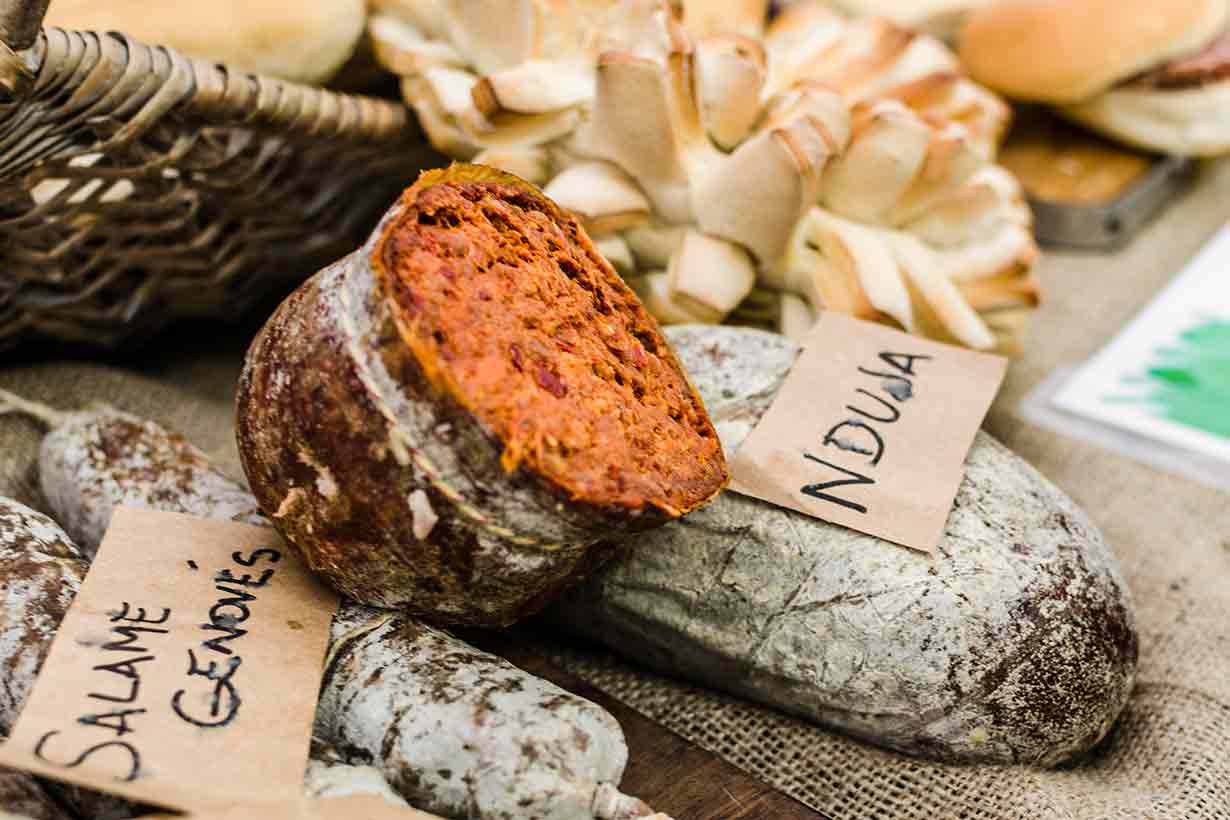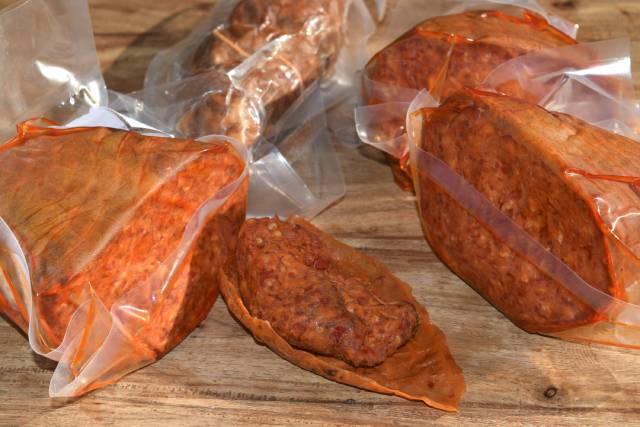What Is ‘Nduja? The Spicy and Spreadable Salami
‘Nduja is an incredibly flavorful pork-based cured meat from the Calabria region of Italy.
This article provides a guide to ‘nduja, how its made, its nutritional values, and how to use it.
What Is ‘Nduja?
Firstly, many people wonder how to pronounce ‘nduja due to its somewhat unique spelling.
‘Nduja is pronounced as ‘en-doo-yah,’ and it is a spicy and spreadable form of salami/sausage.
As shown in the above image, ‘nduja has a bold red color due to its primary ingredients: cured pork and hot chili peppers.
While it does have the appearance of a salami-like product on store shelves, inside the packaging lays a soft and spread-like cured meat.
Rather than being a sliceable product, people tend to use ‘nduja either as a spread or as a flavor-enhancing ingredient in various dishes.
This spicy meat-based spread exploded in popularity in 2016. For those with interest, there is some background reading on that here:
Nduja: how a poor Italian peasant sausage conquered restaurants
In recent years, ‘nduja has increased in popularity, and it is popular with chefs around the world for its ability to give food a spicy kick.
Since ‘nduja is a type of cured meat product, it does not require cooking and can be consumed raw.
How Is It Made?
Cuore di cioccolato, a channel that showcases traditional Italian recipes, has an excellent video demonstrating how to make ‘nduja:
For those who prefer to read, here is a summary of how to make it.
Ingredients
Firstly, typical ‘nduja ingredients include:
- Pork belly
- Pork meat
- Pepper sauce
- Chili pepper
- Chili sauce
- Salt
Store-bought ‘nduja may also contain additional ingredients such as paprika, other seasonings, and preservatives.
Additionally, ‘nduja products may or may not use a lactic-acid starter culture. This ingredient speeds up the aging process and helps to prevent harmful bacteria from developing.
Method
- First, producers grind the pork meat and then mix it with the pepper sauce, chili peppers, and salt.
- After thoroughly mixing the ingredients, the mixture is put into a sausage casing, which is traditionally made from intestines.
- Once the mixture is securely in the casing, the casing is pricked with a needle in various places to make small air holes.
- Next, the ‘nduja sausages are left to age at room temperature for 12 hours.
- After this time, the ‘nduja moves to a refrigerator where it then ages for four weeks.
- Four weeks later, and the ‘nduja is ready to use.
Since the finished product contains large amounts of ground and cured pork fat, ‘nduja has a spreadable consistency.
The combination of chili peppers and cured raw meat makes ‘nduja spicy and very flavorful.
How To Use ‘Nduja
‘Nduja is a little different to cured meats with a solid texture like chorizo and prosciutto.
Rather than being served alongside wine and a cheese platter, it is usually a flavor-enhancing addition to a dish or used as a spread.
Here are some of the typical ways in which we can use ‘nduja.
Soups and Stews
‘Nduja is an excellent flavoring ingredient, and adding it to soups and stews provides a bit of spice.
Using the spread in this way works particularly well in meat-based soups. It is also perfect in stews with ingredients that can absorb flavors, such as potatoes.
This ‘one pot chicken, chorizo, and nduja’ recipe offers an excellent example of how we can use ‘nduja.
Pizza Topping
‘Nduja has also gained popularity as a pizza topping.
Adding a few blobs of the paste gives pizza something a little different, and a fiery contrast to the cheese and tomato.
The BBC has a tasty-sounding ‘nduja and mozzarella pizza recipe for anyone wishing to try.
Sandwich Filling
The addition of some ‘nduja to a sandwich can make it much more enjoyable.
Combined with common sandwich fillings, this spicy spread makes things much more flavorful.
Spread on Meat and Poultry
Just as ‘nduja can be spread on bread, we can also use it as a topping on meat and poultry.
For meat with a relatively bland taste, such as chicken breast, this can kick up the flavor.
‘Nduja Mayo
For those who like things a little spicy, mixing some ‘nduja with mayo makes things a bit more flavorful.
Whether store-bought or homemade mayo, this is a simple condiment to make that only requires a few minutes.
For a ready-made recipe, there is a delicious spicy mayonnaise recipe here.
This mayo can be used in the same way as any other mayo or as a spicy dipping sauce.
Nutrition Facts
Now that we know how to use ‘nduja, what does it offer nutritionally?
Unfortunately, full nutritional values are not available from major nutritional databases.
However, from data provided by branded products, we can see the basic nutritional profile (1).
| Name | Amount per oz (28g) | Amount per 100g |
|---|---|---|
| Calories | 145 kcal | 512 kcal |
| Carbohydrate | 0.62 g | 2.19 g |
| Fiber | 0.34 g | 1.2 g |
| Sugars | 0.15 g | 0.54 g |
| Fat | 14.3 g | 50.46 g |
| Saturated | 5.17 g | 18.26 g |
| Monounsaturated | 6.64 g | 23.43 g |
| Polyunsaturated | 1.63 g | 5.77 g |
| Protein | 3.47 g | 12.24 g |
Nutritional Benefits
As the main ingredient in ‘nduja is pork, it will also have many of the same nutritional benefits.
Therefore, this meat paste is a good source of protein, and it also offers selenium and a broad range of B vitamins in high amounts (2).
Since ‘nduja is made with large amounts of chili pepper, it also contains relatively high amounts of capsaicin. Research shows that this is approximately 17 mg of capsaicin per gram (3).
Capsaicin is the chemical compound in chili peppers responsible for their heat, and it may potentially have some benefits for vascular function (4).
However, there are limited human trials to support strong claims in this regard.
Nutritional Downsides
On the negative side, like most cured meat products, ‘nduja will have a high salt content.
While the exact amount will vary from brand to brand, all ‘nduja recipes require large amounts of salt for the curing process.
As a result, individuals on low-sodium diets may wish to limit their ‘nduja intake or at least discuss it with their medical team.
Furthermore, some ‘nduja products use sodium nitrate and sodium nitrite.
These two preservatives can potentially form nitrosamines during the curing process. These compounds are thought to be carcinogenic to humans (3).
On this note, a meta-analysis of large cohort and case-control studies demonstrated that dietary nitrites and (particularly) nitrosamine intake increased the risk of gastric cancer (4).
However, the researchers noted that the evidence base is not strong enough to make definitive conclusions and that more high-quality research is necessary.
Where To Buy
It should be possible to buy ‘nduja or products containing it at most larger supermarkets.
That said, it can be more difficult to find traditional products.
It is easy to find a variety of traditional ‘nduja products online, but the price tends to be more expensive.
If possible, the best bet is to find a local Italian deli, as these stores should stock traditional ‘nduja products for a more reasonable price.
Final Thoughts
While it may have some potential health benefits and downsides, ‘nduja is not an ‘everyday’ type of food.
However, it is a deliciously spicy cured meat product that brings a lot of flavor to food.
For those who enjoy cured meats and spicy food, it is worth giving ‘nduja a try.
Related Articles
12 Types of Cured Meat: Traditional and Delicious Options



2 thoughts on “What Is ‘Nduja? The Spicy and Spreadable Salami”
The German equivalent is very similar and called “Teewurst” (a spreadable smoked sausage made from raw ground pork & pork belly, a bit of cream and sometimes even honey, and spiced with nutmeg, mace, cloves, and lots of pepper). There are several regional variations as well.
That’s interesting! Thanks for the information, I wasn’t aware of teewurst. I’ll look out for it.
Comments are closed.